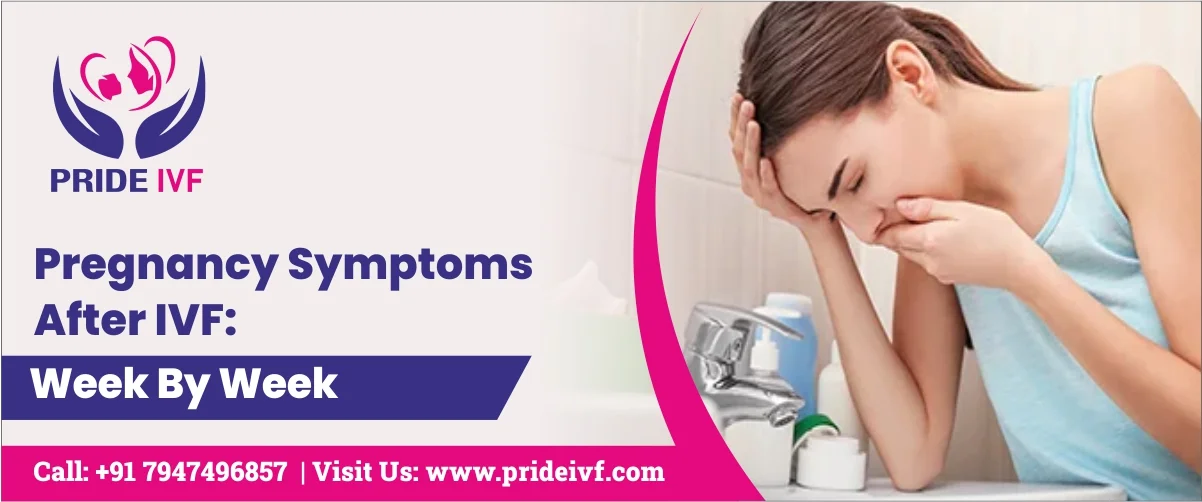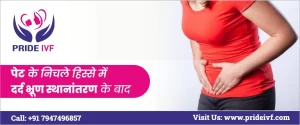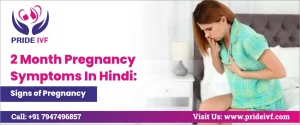IVF, or In-vitro fertilization, has been a ray of positivity and hope for couples trying to conceive a baby. Today, many individuals are becoming new parents only with the help of the IVF method. These mothers face pregnancy symptoms after ivf just like any other pregnant woman. With each month or week, symptoms change as the delivery date approaches. The embryo becomes a fully developed baby, and the symptoms manifest in the mother’s body. From morning sickness to unusual cravings, symptoms can vary from one person to the other. It is important to understand these symptoms and be patient as the mother and the baby’s body change through time.




Pregnancy Symptoms Immediately After Embryo Transfer
After undergoing embryo transfer in IVF, which is also sometimes done in combination with prp for infertility (PRP Ovarian Rejuvenation), it is natural to wonder about the early signs of pregnancy. While it is essential to remember that every woman’s experience can vary, some common symptoms might indicate a successful implantation. However, it is also important to remember that these symptoms can also occur due to medications or the IVF process itself. So, it is best not to rely solely on symptoms for confirmation of pregnancy. A blood test or a urine test ordered by a healthcare provider is the most reliable way to confirm pregnancy after IVF. After Embryo Transfer Day By Day, Symptoms are as follows-
- Spotting: Some women may notice light spotting a few days after embryo transfer. This is known as implantation bleeding. It is usually lighter than a regular period.
- Cramping: Mild cramping similar to menstrual cramps might occur as the embryo implants into the uterine lining.
- Breast Tenderness: Hormonal changes can cause breast tenderness or sensitivity. This is similar to premenstrual symptoms. These are just common Body Changes After Embryo Transfer.
- Fatigue: Feeling more tired than usual can signify early pregnancy. This is because the body adjusts to hormonal changes.
- Nausea: While morning sickness typically starts later in pregnancy, some women might experience mild nausea shortly after embryo transfer.
- Increased Urination: Hormonal changes can increase urination frequency in some women.
- Emotional Changes: Mood swings or heightened emotions might occur due to hormonal fluctuations.
Pregnancy Symptoms in the First Trimester After IVF
During the first trimester of pregnancy following IVF, women may experience various symptoms as their bodies adjust to the changes of early pregnancy. The doctors at the Best IVF Centre in Delhi can tell you more about this.
- Nausea and Morning Sickness: Nausea, often accompanied by vomiting, is common in early pregnancy. It typically starts around six weeks after conception. This symptom can be more pronounced in IVF pregnancies due to hormonal changes. Also Read: How Is IVF Pregnancy Different From Natural Pregnancy?
- Fatigue: Feeling exhausted, even after adequate rest, is prevalent in the first trimester. Hormonal shifts and increased metabolic demands contribute to this fatigue.
- Breast Changes: Breasts may become tender. They can be swollen or heavier due to hormonal fluctuations. Nipples may darken in color and become more sensitive.
- Frequent Urination: Increased urination is common in early pregnancy. This is due to the uterus expanding and pressing against the bladder. This symptom can be particularly noticeable in IVF pregnancies.
- Food Aversions and Cravings: Many women experience changes in their appetite and food preferences during the first trimester. Certain smells or tastes may become intolerable. Cravings for specific foods may arise. Expected mothers may be heard wondering what to eat in pregnancy.
- Mood Swings: Hormonal changes can lead to mood swings. Mothers can become irritable and emotionally sensitive during this time. IVF pregnancies may be associated with heightened emotional responses due to the stress and anticipation involved in the fertility treatment process. Many women and men ask ivf kya hai, and it is understandable when they do not understand the symptoms properly. Mood swings are just a part of the process.
Lets get started
Pregnancy Symptoms in the Second Trimester After IVF
During the second trimester of pregnancy following IVF, women may experience a continuation of earlier symptoms along with additional changes as the pregnancy progresses:
- Decrease in Nausea: Many women find relief from morning sickness and nausea as they enter the second trimester. However, some may continue to experience these symptoms to a lesser extent.
- Increased Energy: Fatigue often diminishes during the second trimester. Many women report feeling more energetic and able to resume normal activities.
- Visible Body Changes: The belly starts to visibly grow as the uterus expands to accommodate the growing fetus. Women may notice their clothes fitting tighter around the waist.
- Skin Changes: Some women experience changes in their skin. This can include darkening of the skin around the nipples. A dark line known as linea nigra appears on the abdomen. There is also an increase in oiliness or acne. This is one of the common pregnancy symptoms after ivf.
- Braxton Hicks Contractions: These are mild, irregular contractions that can occur in the second trimester. They are often described as a tightening or squeezing sensation in the abdomen.
- Back Pain: As the belly grows, the body’s center of gravity shifts. This puts strain on the back muscles and leads to back aches for many pregnant women.
- Leg Cramps: Some women experience painful cramps in the calves or thighs, especially at night. This is due to changes in circulation and pressure on the blood vessels from the growing uterus.
- Increased Appetite: Appetite often increases during the second trimester as nausea subsides. The body requires more energy to support the growing baby.
- Movement Sensations: Women may begin to feel the baby’s movements. This is often described as fluttering or quickening. It is usually between weeks 16 and 25 of pregnancy.
Pregnancy Symptoms in the Third Trimester After IVF
Now that you are in the third semester, you know how to make ivf successful the first time. So, in the third trimester, the symptoms are usually:
- Increased Discomfort: There is pressure on the abdomen and pelvis since the bay is growing larger. It will cause discomfort and difficulty finding a comfortable position. You can see many women trying to find a suitable sleeping position after ivf.
- Braxton Hicks Contractions: These practice contractions may become more frequent and intense. The body will be preparing for labor, and hence, such contractions will arise.
- Swelling: Many pregnant women complain of swelling. It also happens, especially in the feet and ankles. It is common due to increased fluid retention and pressure on blood vessels.
- Shortness of Breath: As the uterus expands, it can push against the diaphragm. This leads to shortness of breath. Again, it is one of the common pregnancy symptoms after ivf.
- Fatigue: Fatigue may return as the body works harder to support the growing baby.
- Frequent Urination: Pressure on the bladder increases as the baby descends into the pelvis. This leads to more frequent trips to the bathroom. You can consult the Best IVF Doctor In Delhi to understand more about these bodily changes.
- Nesting Instinct: Some women may experience a sudden burst of energy. There can be a strong urge to prepare for the baby’s arrival by organizing and cleaning the home.
Conclusion
Hence, those were all the symptoms one can expect with each passing week and month of pregnancy. These pregnancy symptoms after ivf are common and normal to have. However, if you are feeling something unusual or having excessive symptoms, do not hesitate to call your doctor and tell them about it.




